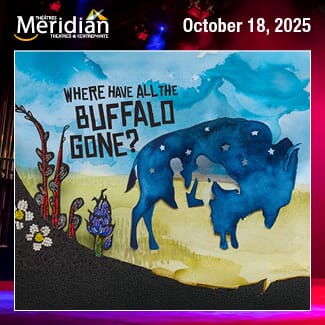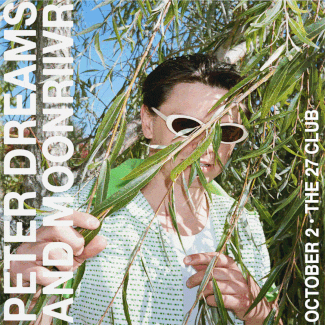Directed by the multi-talented Greenlandic artist Laakuluk Williamson Bathory and starring Iqaluit’s Vinnie Karetak and Charlotte Qamaniq, Qaumma is a powerful theatrical exploration of the pain and trauma of colonization experienced by Inuit—both historically and in the present day.
At its core, the play is a testament to the unyielding strength and resilience of Inuit people in the face of systemic efforts to eradicate them from their homeland. Williamson Bathory’s intention is clear from her opening remarks: this is a play for Inuit. It claims space unapologetically and speaks truths that demand to be heard.
The performance navigates two contrasting styles of theatre, creating moments of both visceral emotionality and reflective narrative. The piece opens with an intense and evocative expression of the trauma inflicted upon Inuit communities through colonization.

Charlotte Qamaniq in Qaumma. Photo by Curtis Perry.
Karetak and Qamaniq move dynamically through the space, engaging directly with the audience, giving name and voice to the pain on the hearts of every Inuit family. Their performance is accompanied by music and visual projections on the giant iceberg that dominates the set. This segment crescendos in a storm of rage and emotional intensity that leaves a profound impact.
Following this, the play shifts to a quieter and deeply personal narrative. Karetak recounts the story of his grandmother, who endured the forced settlement and relocation that uprooted so many Inuit. Her attempt to journey back to her home was marked by unimaginable loss and trauma, which she barely survived herself with Karetak’s infant mother strapped to her back. Upon her return to the settlement that is not her home, she faces charges under laws which are equally unfamiliar and foreign.
She is told by the judge to forget the entire ordeal, and so she does not speak of it again for many years. For Karetak, the story of his grandmother embodies resilience and love in the face of overwhelming adversity. He tells her story in a slow and wandering narrative, as though he is piecing together fragments of a family history laden with unspoken pain. He acknowledges how this inherited trauma has shaped his own identity, creating a poignant moment of intergenerational connection.

Scene from Qaumma. Photo by Curtis Perry.
The final act returns to the energy and intensity of the opening, with Karetak and Qamaniq once again moving through the space and calling the audience in to their emotional landscape. This act contains strong symbolism, including the destruction of the church and its oppressive influence—a powerful rejection of colonial domination.
The performance calls upon Inuit to reclaim their identity and celebrate their inner light, which, despite years of attempts to extinguish it, continues to burn brightly. The music in this act uplifts the audience, carrying them along on a journey towards hope and resilience. It’s a call to action: to honour and take pride in their Inuit heritage.
While the play’s emotional and thematic depth is undeniable, the transitions between the two contrasting theatrical styles—the raw, visceral opening and closing acts and the slower, reflective middle—felt somewhat disjointed. The shift was abrupt, creating a barrier to fully immersing in the narrative’s flow.

Vincent Colin Karetak in Qaumma. Photo by Curtis Perry.
The original musical score, composed by Greenland’s Aqqulu, was a standout element of the production. It brilliantly underscored the emotional arcs of the first and final acts, amplifying their intensity and poignancy. However, the absence of music during Karetak’s narrative felt like a missed opportunity. A well-placed score could have punctuated the emotional beats of his story and drawn the audience deeper into its emotional resonance.
Ultimately, Qaumma is a deeply moving and thought-provoking production that offers perspective on the experiences of Inuit communities along Hudson’s Bay and across Inuit Nunangat. The play leaves a lasting impression, challenging the audience to confront the truths of colonization and celebrate the enduring strength of Inuit resilience.
Qaumma performs at the National Arts Centre from Jan. 15-17. You can book your tickets online, and for more information about Qaumma or other shows at NAC’s Indigenous Theatre programming, visit their website.














